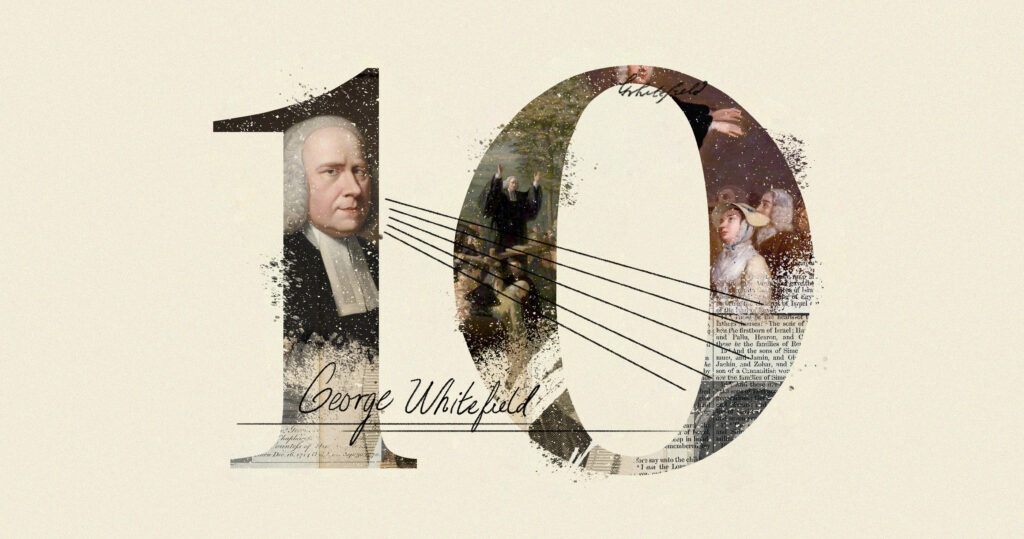10 Issues You Ought to Know About George Whitefield

This text is a part of the 10 Issues You Ought to Know collection.
1. Whitefield persistently proclaimed the need of the brand new delivery.
When George Whitefield entered Pembroke School at Oxford College in 1732, he was quickly drawn to Charles and John Wesley and others who had fashioned what has usually been known as the “Holy Membership” (extra precisely referred to as the Oxford Methodists). These earnest males sought not solely to attract nearer to God by means of extremely regimented non secular disciplines but in addition engaged in acts of charity, together with visiting prisoners and serving to these in want. Regardless of this depth, Whitefield turned exhausted by his lack of peace in his relationship with Jesus Christ. As he redoubled efforts, his extreme asceticism nearly drove him mad. Charles Wesley gifted him a e book by the Scottish minister and professor Henry Scougal, The Lifetime of God within the Soul of Man, that unlocked the thriller of the brand new delivery for him. This led to the liberating expertise of Whitefield’s conversion and expertise of the brand new life in Christ.
Surprisingly, this was not his first sermon, however reasonably “The Necessity and Good thing about Non secular Society” (i.e., small teams). But it surely was his second sermon, merely known as “On Regeneration,” and one which he repeatedly proclaimed. Even in sermons on completely different subjects, Whitefield regularly returned to the crucial significance of the brand new delivery. For Whitefield, central to being born once more have been the themes of union with Christ, the indwelling presence of the Holy Spirit, and the emphasis on inward transformation that might proceed to resonate all through his ministry.
2. Whitefield was a satisfied Calvinist.
By his personal admission, Whitefield didn’t see himself as a theologian—at the very least not a theologian of the standard kind. As a substitute of writing systematic theologies, Whitefield most popular to speak his theology by means of sermons. Most of his evangelistic sermons function three doctrines: conviction of sin, justification by grace by means of religion, and the need of experiencing the brand new delivery.
But when Whitefield wasn’t a scientific theologian, that’s to not say that he didn’t have sturdy theological convictions. Whereas a few of his fellow first-generation evangelical contemporaries like John and Charles Wesley have been Arminian of their theology, Whitefield was a satisfied Calvinist. In different phrases, Whitefield emphasised the ultimacy of God’s alternative in our salvation, however not on the expense of our real human accountability. God makes use of secondary means, like preaching and preachers, to attract his elect to himself. And he emphasised that when God justifies us, he forgives all of our sins: previous, current, and future. And never solely that, he imputes Jesus’s righteousness to us. And he emphasised the way in which God preserves these he’s saved: he guarantees to finish the nice work that he’s begun in us.
Whitefield was prepared to contend for these theological convictions within the public sphere, even when it resulted in important interpersonal friction, most notably through the so-called Free Grace episode that cut up the early Methodist motion alongside Wesleyan-Arminian and Whitefieldian-Calvinist strains.
George Whitefield devoted his life to instructing the Scriptures and calling folks to know and love God. This biography explores the lifetime of Whitefield as a distinguished determine within the early evangelical revival in an trustworthy, historic, and balanced method.
3. Whitefield warned of the risks of being an “Nearly Christian.”
Whitefield contrasted what he thought-about to be the biblical view of following Christ with the counterfeit understanding that did this in speech and look solely. The previous he termed an “altogether Christian,” whereas the latter he known as an “nearly Christian.” The grave hazard of being an “nearly Christian” was that the individual was solely a partial believer. As a substitute of looking for the steering of God’s phrase to direct their life, they have been extra influenced by the dazzling sights of the world. In his sermon “The Nearly Christian” primarily based on Acts 26:28, Whitefield proclaimed there have been 4 marks that distinguished a trustworthy disciple of Jesus Christ. First, a believer is somebody who understands and cultivates true faith (or a honest faith of the center).
Second, Jesus’s disciples have to be stuffed and guided by the presence and energy of the Holy Spirit. And third, they need to search to persistently deny themselves, take up their cross, and be Christ’s followers (Luke 9:23). The fourth and most difficult indicator is persecution for the reason for Christ, or at the very least willingness to undergo for him if wanted. Apparently, John Wesley preached on the identical textual content with the identical title three years later.
4. Whitefield hungered for communion with God in his private life.
George Whitefield possessed a passionate want to know and make God recognized to anybody who would hearken to him. Shortly after his conversion in 1735, he effusively declared he skilled “candy communion” with God. Greater than the emotional excessive of a dramatic conversion that was grounded in his union with Christ, this language communicated a deep sense of intimacy and pleasure with the dwelling God. He acknowledged already as a younger man that life was tough, and whereas candy communion was not his ordinary expertise, however it was the constant and lifelong want of his coronary heart. This superlative description of “candy communion” was nearly solely reserved for his relationship with God. But he was additionally able to find nice pleasure in his friendship with others and designated these occasions as candy fellowship.
His journals reveal he delighted in God by means of varied non secular practices, together with prayer, meditating on Scripture, celebrating the Lord’s Supper, and even studying devotional classics from earlier Christians. These and different non secular workout routines flooded his soul with a heavenly mindedness and contemplative enjoyment of God.

We All Want Reminders!
Within the busyness of life it’s all too straightforward to overlook who God is, what he has finished for us, and who we’re due to him. Crossway needs to assist! Join right now to obtain concise Scripture-filled, gospel-saturated reminders that can encourage you and strengthen your stroll with Jesus.
5. Whitefield taught the technique of grace to encourage strolling with God.
The aim of the Christian life is fullness of pleasure and full union and communion with Jesus Christ. An outgrowth from Whitefield’s private expertise of God was to instruct others within the correct use of the technique of grace in order that they, too, would possibly develop in intimacy with God. His sermon “Strolling with God” offered the clearest description of important non secular practices that he hoped others would domesticate. These have been studying Scripture, private prayer, meditation on Scripture, noticing God’s providential dealings, observing the promptings or steering of the Holy Spirit, making full use of the sacraments, and maintaining firm with different Christians who deliberately sought to stroll with God. All through his writings, he added extra practices, however these seven have been foundational. Since strolling with God was doable solely by means of union with Christ, Whitefield adopted the Puritan follow that careworn the believer was married to Jesus Christ as a method to extend an individual’s want for this deeper enjoyment of God.
6. Whitefield was a non secular director who guided misplaced and confused souls to Jesus Christ.
Whitefield is greatest recognized for his mesmerizing preaching, however he was additionally a extremely expert doctor of the soul, or what we’d name a non secular director or information right now. He discovered these ideas from studying Puritan works on spirituality, conversion, and Christian development in addition to his intensive community of correspondence. Folks from all walks of life, each well-known and customary, wrote him looking for counsel. One of many main instruments of a non secular director is asking questions, and Whitefield used prompts resembling “Do you develop in grace?” and “Is the world extra beneath your toes than traditional?” Central to this ministry of directing souls to Christ helps the individual acknowledge that salvation will not be solely figuring out the suitable doctrine cognitively however experiencing these truths deep inside their coronary heart.
7. Whitefield was well-known for his itinerant, extemporaneous preaching.
Whitefield was a family identify through the eighteenth century—in reality, in some ways, the primary evangelical movie star preacher. Eschewing a settled pulpit, he made his identify as an itinerant field-preacher, crossing the Atlantic 13 occasions and preaching an unlimited variety of sermons all through his life—over 18,000 by most estimates. He preached a lot of these sermons outdoor, usually to huge audiences of greater than 20,000 folks.
“Discipline-preaching is my plan. On this, I’m carried as on eagles’ wings” is how he as soon as put it.
Past his repute because the “Grand Itinerant,” Whitefield was also referred to as an extemporaneous preacher—in different phrases, he sometimes memorized his sermons and preached with out notes. Whereas a lot of his contemporaries learn out their sermons, Whitefield was well-known for his flamboyant, dramatic preaching model. He was a gifted actor in his youth, and in time he translated this capability into his preaching. When he proclaimed the gospel, the Bible was his sacred script, and makeshift pulpits turned a type of sanctified stage.
The aim of the Christian life is fullness of pleasure and full union and communion with Jesus Christ.
8. Whitefield was early evangelicalism’s relational glue.
Whitefield was a natural-born networker. He functioned because the hub of a widespread and in any other case disparate evangelical neighborhood, fostering a prodigious variety of relationships throughout his comparatively quick however well-travelled and linked life. Certainly, simply as his evangelistic ministry deliberately spanned and transcended spatial, socioeconomic, theological, and denominational boundaries, so too the relationships Whitefield developed throughout greater than three a long time of public ministry have been remarkably various. These included revivalist counterparts like John and Charles Wesley, whose Arminian theological convictions differed subtly however considerably from his personal; aristocratic patrons of the burgeoning Methodist motion, just like the Calvinist Selina Hastings and the Countess of Huntingdon; and even avowed Deists, like Benjamin Franklin, who printed Whitefield’s journals and sermons, having fun with a candid relationship with a determine like Whitefield who additionally lived his life within the public eye.
9. Whitefield was complicit in defending and increasing slavery within the American colonies.
No doubt, one of the crucial troubling elements of Whitefield’s legacy was his involvement with slavery, one of the crucial ubiquitous options of life within the eighteenth-century British world. At first, Whitefield was controversial for the way in which he criticized slave masters within the American South for the terrible method they handled their slaves. But it surely wasn’t too lengthy earlier than he made the fateful determination to turn into a slave grasp himself. In 1751 he wrote, “As for the lawfulness of maintaining slaves, I’ve little doubt.”
Not like a lot of his contemporaries, Whitefield noticed slaves as folks created within the picture of God, and he urged slaves to expertise the brand new delivery and non secular liberation. However in a failure of biblical love and justice, he by no means advocated for the bodily emancipation of slaves.
A product of his time and place, Whitefield was influenced, with out being inevitably decided, by his context. Like all of us, he was additionally stuffed with confounding contradictions. Whitefield’s failures, much more seen with the advantage of three centuries’ price of hindsight, function a cautionary story of the risks of complicity with our tradition’s fallenness. But it surely additionally forces us to ask: Are there planks in our personal non secular eyes that threaten to impair the readability of our ethical imaginative and prescient?
10. Whitefield was the proto-evangelical.
Whitefield embodied and exemplified most of the options which have come to characterize evangelicalism for the previous 300 years.
First, Whitefield was a non secular entrepreneur. He blazed a path for future generations of evangelicals by exploiting new types of mass communication. In his case, this was the rise of a rising print and shopper tradition. He used newspapers and broadsides as a method of selling revival and reaching as huge an viewers as doable.
Second, Whitefield was a mannequin of evangelical ecumenicity. He positioned a premium on mobility and chafed towards provincialism and parochialism, fostering relationships with Christians from a number of completely different denominations. He was energetic about creating inter-denominational connections with kindred spirits.
However third, Whitefield was additionally prepared to bypass ecclesial buildings altogether. The truth is, he was a pioneer in making a trans-denominational evangelical neighborhood. Within the course of, he helped domesticate evangelicalism’s signature fondness for parachurch ministries and movie star preachers.
Ian Maddock and Tom Schwanda are coauthors of Whitefield on the Christian Life: New Start to Take pleasure in God.
In style Articles in This Collection










